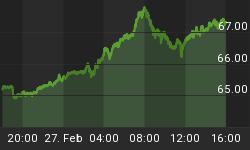Stocks jumped 0.9% in what has become a rather normal response to a decline: an aggressive, almost in-your-face rally with (often) little provocation other than the general sense that stocks are going up. This is a key difference at the moment between equity bulls and equity bears: the bears have specificity on their side while the bulls rely on generality.
The fact that equity bears can point to lots of specific reasons to be concerned about the level of equity market valuation does not necessarily mean that that argument will triumph over the general retort that an improving economy will salve all wounds, but I think it's an apt characterization. As a personal exercise, try and name something specific about the equity market or global geopolitics that is more positive than what is already priced. I can't think of anything; whatever positive facet I reflect on seems to be fully understood and have scant room for improvement over the expectation. For example, it may be true that mortgage defaults are declining, but this isn't a mystery to anyone and it isn't clear how that surprises on the positive side: are defaults going to plunge? I suppose that's possible, but I can't think of why that would be the case.
Certainly the specific news today shouldn't have been particularly accommodating for stocks. Crude oil (WTI) dropped -0.6% along with grains (-1.6%), but that's a pretty small set-back and inflation breakevens nevertheless rose 3-5bps. Meanwhile, Greek 10y bond yields rose 46bps and Irish bonds 15bps (in a generally down market: yields in the rest of Europe rose 3-10bps). Some of this was in response to hawkish comments from Bundesbank President Weber which seemed to support Trichet's comments from last week and hints from a NY-based consultant that some FOMC members are getting antsy about the open-ended commitment to low rates. If everyone is getting hawkish, that can't be good for stocks can it? I seem to remember an old Marty Zweig commercial: "If you can spot meaningful changes, not just zig-zags, in interest rates and momentum, you'll be mostly in stocks before major advances and out before major declines."
Well, the hawkish talk also ought to have been bearish for bonds, but the bond market dropped only 2-3bps and the 10y is at 3.546%. I suspect that most observers are justifiably skeptical that the world's central banks are about to replicate the classic monetary policy error of the 1970s and tighten into an energy spike. I doubt that they would do that even with banks not on the ropes and sovereign balance sheets creaking under the strain of massive deficits that can be repaired much more easily with robust economic growth (and if that growth happens with a pinch of money illusion through inflation, so much the better). The consultant suggested that Fed officials may make some change to the language of the statement at one of the next couple of meetings to guard the "extended period" promise. Gee, what a shock that would be...not. However, treating that as equivalent to, or even a precursor to, an actual tightening of policy sometime this year? Very unlikely. If the economy begins to really boom, perhaps a token shot will be fired off at some point, but I wouldn't hold my breath for it.
The Bundesbank and the ECB are also not particularly credible, although perhaps 1% more credible since Weber said that "99% of the time, we have gone the right way" in the context of financial stability measures, while Bernanke in early December told "60 Minutes" that he was "one hundred percent" certain that he could control inflation from rising above "two percent or less." So Weber is 1% less crazy than Bernanke...actually, probably moreso since Bernanke was talking about the future while in principle it could be the case that the ECB was right about 99% of the measures they took. They weren't, but at least in principle it's possible while it is not possible for a sane man to be 100% confident about anything (especially having to do with the financial markets). And I am 100% certain about that.
Anyway, I am not sitting up nights worrying if the world's central banks are going to tighten tomorrow. At some point they will, but the market will discount it about four times before it happens (remember that at the beginning of 2010, December Fed Funds futures were trading below 99.00); does that mean that it might be worth selling December 2011 Fed Funds for a trade when they're trading 99.70? Sure, on the expectation that at some point this year they'll probably trade below 99.50 with very little chance of first going to 99.90. But I think they'll settle closer to the latter point than to the former.















